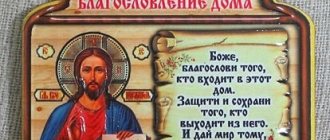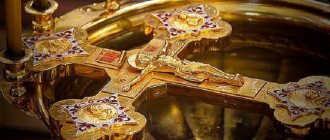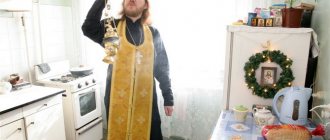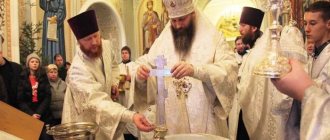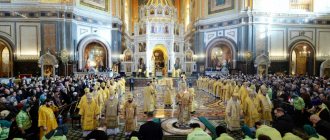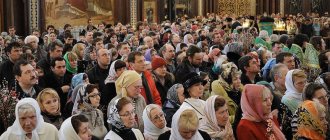To consecrate your house means to dedicate it to God, says Archimandrite Chrysostom (Grischenko).
Many have heard about the rite of consecrating a house or apartment, or even participated in it themselves. Not everyone, however, understands the meaning of this ritual: some doubt its necessity, while others, on the contrary, treat it as some kind of magical act.
Preparing for the ceremony
At the basis of every church ritual is the desire to spiritualize the activity of a particular person. A Christian asks God to direct life along a righteous path that brings benefit. Orthodox believers, through the rite of consecration, receive a Divine blessing, which helps to create a world filled with love around them.
The ritual of consecrating a home protects against dark energy
Sanctification is the name given to the ritual through which the Lord enters the personal or church life of a Christian. It is usually carried out after moving to a new home or when renovations have been completed. You are allowed to do the ritual yourself if it is not possible to invite a priest. The tradition of consecration has existed since ancient times, when Christianity was just beginning to spread throughout the world. Followers of Jesus knew that holy water and prayer could protect the home and personal space from the interference of evil forces.
Advice! To consecrate the home, you need to invite a priest from the temple.
Fathers are endowed with special grace that allows them to perform consecration. A layman just needs to go to the nearest temple and discuss the time of the ceremony with the ministers.
What is the meaning of sanctification
Orthodox Christians call sanctification the rites that are introduced by the Church into the temple and personal life of a person, so that through these rites the blessing of God descends on his life, on all his activities and on the entire environment of his life.
The basis of the various church prayers is the desire to spiritualize human activity, to perform it with God's help and with His blessing. We ask the Lord to direct our affairs in such a way that they are pleasing to Him and benefit our neighbors, the Church, the Fatherland and ourselves; bless our relationships with people so that peace and love prevail in them, etc. And therefore we ask that our home, things that belong to us, vegetables grown in our garden, water from the well, through the blessing of God that has descended on them, help us in this , defended, strengthened our strength.
The consecration of a house, apartment, car or any other thing is evidence, first of all, of our trust in God, our faith that nothing happens to us without His holy will.
The Church sanctifies everything necessary for human life with prayer and blessing. The Church sanctifies all nature and all the elements: water, air, fire and earth.
Rite of Consecration
Without divine blessing and the help of the Creator, nothing truly valuable and truthful will happen in a person’s life.
- Before starting the construction of an ordinary house, it is necessary to lay a cross at its foundation, and install holy images inside the room, which notify about the presence of the Lord and His saints here. It is allowed to conduct all church rituals in the home, except for the Liturgy and priesthood rites.
- For the ritual, special prayer services have existed since ancient times. The Trebnik indicates the ranks: for “foundation” and protection from evil spirits. Before the consecration itself, a small blessing of water is used, supplemented by the use of oil, a cross, candles and the Gospel.
- A cross is depicted on each wall of the home, designed to become protection against the penetration of evil forces and enemies. During the ritual, the Church inspires Christians, saying that living in a consecrated house will henceforth be under the protection of the Almighty.
Priests have the right to consecrate a house - Afterwards a troparion is sung, telling the story of the Messiah’s entry into the house of Zacchaeus. Christ granted salvation to both the owner and all his relatives. In a similar way, during the ritual, servants of the Son of God and powerful Guardian Angels enter the house, protecting the peace of an honest Christian.
- The priests performing the ritual humbly ask the Lord to grant the dwelling blessings and health to the living. The priest continues to praise Christ and the Omnipotence of the Father. In addition, he reads a secret prayer (not out loud) and asks for divine protection. The priest calls in his prayers the Guardian Angels, as well as the Monk Cyprian, who managed to defeat the demonic obsession with the help of faith.
- Next, the priest makes the sign of the cross over the oil three times, this helps drive out satanic slander. The priest sprinkles holy water on all the walls of the home, driving away demonic influence.
- He smears with oil those places where crosses had already been drawn, which are the protection and sign of the victory of virtue. Guardian angels present at the ritual sing prayers and ask God for abundance in this house and the granting of heavenly blessings. Before the inscription, church candles are lit next to the crosses.
- Next, the priest reads sacred instructions on how a Christian should behave in a newly consecrated house. Every believer must follow the commandment of King David and follow the path of life in the integrity of his own heart.
- At the end of the ritual, a litany is pronounced, where the priest prays to the Lord to send the residents a powerful Guardian Angel, who has the power to remove all sorts of troubles from the house.
Strict prohibitions associated with memorial periods: 9 and 40 days
The procedure does not end with burial. In Orthodoxy and Islam it is customary to make a commemoration. Christians convene people to honor the newly deceased (counted from the date of death):
On the morning after the burial, those closest to him bring breakfast to the churchyard. Friends and comrades join at will.
- On the third day they gather in a tight circle.
- On the ninth, they treat colleagues and neighbors to funeral baked goods.
- On the fortieth day they hold a feast, the same as a wake.
The funeral meal must comply with religious canons. The Church recommends adhering to the following standards:
- It is advisable not to drink alcohol. A shot of vodka covered with a piece of bread is not welcome. This ritual is secular in nature.
- A photo of the dead person is placed on the funeral table. Do not light a church candle before taking a photo. It is supposed to be placed near the Icon. And place a photo next to it.
- Place the kutya consecrated in the temple on the table. Make the menu out of three simple dishes (the first liquid, the second hot, pie and compote).
- Those gathered should not: speak badly about the newly deceased, express emotions violently, or indulge in fun.
You can help your orphaned relatives and souls only through prayer. Order a funeral service. It is repeated at specified times, as well as every anniversary.
Folk superstitions:
- For the first nine days, do not look at your own reflection. It is believed that this is a sign of premature death.
- Household members should not be left alone, especially at night. Psychologists completely agree with this.
- You are not allowed to take things out of the house, move furniture, or repair premises for forty days. The soul is still saying goodbye. He will arrive and will not recognize the rooms. Will be bad.
- Don't take anything from the graveyard. Any little thing will open the path to disaster. Leave flowers at the grave.
- Days of mourning are spent at home. It is not advisable to go on a visit yourself and receive visitors at your place.
People determine the duration of mourning themselves. Religious citizens yearn for a year. In our conditions, such a long period is not necessary. It is advisable for the widow and children of the newly deceased to refrain from entertainment for the first two months.
Self-sanctification
If it is not possible to invite a priest, you can perform a small illumination yourself. Of course, this will not be a full-fledged church ceremony - sooner or later you will need to take care of inviting a priest. But if for some reason this cannot be done, you can get by with little.
To carry out the consecration ceremony you will need icons, church candles and a prayer book.
Before, during and after the ritual, a Christian must adhere to the following rules:
- When reading a prayer, you should mentally turn to the Almighty, the Mother of God, Christ, Guardian Angels or other saints. Thoughts about empty and meaningless things can harm the ritual. You should concentrate your consciousness on God and clearly pronounce every word of prayer, seeing the true meaning in these actions.
- The lifestyle of a believer must correspond to the high title of a Christian. Visiting church is a necessary condition for a Christian seeking to get rid of the invasion of passions.
- A person must show sincere faith in the Lord and forget about selfishness. He needs to learn to give love to everyone, even the enemy, and be able to rejoice in the achievements of others. A person needs to observe the sacred commandments and distance himself from evil thoughts.
. The process of consecration itself contains some features.
- The bowl of holy water brought from the church is in the left hand, while the Christian sprinkles drops on the walls of the house with his right hand.
- It is customary to start the ritual from the corner located on the eastern side, the movement occurs clockwise.
- It is customary to read “Our Father” as the main prayer. In addition, the ritual can be supplemented with others: “May God rise again” and Psalm 90.
- Most often, such sprinkling is carried out on the feast of the Epiphany.
Important! The church calls apartments in which they engaged in debauchery, drunkenness, swearing and fighting, unclean. It is precisely such dwellings that should be sanctified first, because such houses are shrouded in negative energy and are a receptacle for dirty demons. People in such conditions experience constant troubles, face big problems, and there is no peace in their souls.
Why is it so important to consecrate houses in our time?
According to the teachings of the holy fathers of the Church, the unclean spirit, the devil, the prince of darkness and hell, the spirit of malice, the enemy of the human race, dominates the air until the second coming of Christ. The Slavic word air has several meanings. This is the atmosphere of the earth in which we physically exist; this includes the airwaves, which today are more crowded than ever with radio waves, television, cellular and radio signals; this, finally, is what modern pagans and Jews call the astral plane - the area of spiritual visions and contacts, in which, like nowhere else, the devil resides and dominates with legions of unclean spirits.
Television, press and radio broadcasting, anti-Christian in spirit, corrupting the Russian people today worse than any wine and vodka, have become the main sources of spiritual food for the Russian people. Today, in almost every home, a “blue icon” of the devil is placed in a red corner - a television, in front of which the population of Russia spends hours on end, as if in a narcotic sleep, hypnotized and programmed for self-destruction and extinction.
Through the ether and astral plane, our houses, apartments, cars were filled with countless legions of demons: spirits of aggression, anger, revenge, shameless passion. People are no longer able to understand how their family and life well-being is being destroyed with the help of thoroughly developed technologies for destroying the traditional system of values, ethics, and morality. Few people today are able to connect the disobedience of children, their addiction to alcohol and drugs, the endless divorces of young and middle-aged married couples with the presence in their home of a real enemy - a television, a radio, a tabloid newspaper, which skillfully undermine the morality of society, the family, through the implanted poison of vulgarity and debauchery. a cult of pleasure that leads more and more souls to destruction.
Therefore, today the grace of God, given through the rites of consecration, in particular, through the consecration of our homes, is especially necessary for us to help us protect, consciously protect ourselves from the viruses of sinful temptation and spiritual decay that penetrate our homes.
What should be done with the belongings of a deceased person and after what time?
The church does not establish strict rules on this matter. Relatives usually sort them out within 40 days. The following rules have been adopted:
- Items mentioned in an oral or written will are transferred to the heirs.
- Memorabilia is distributed to relatives upon request. It is allowed to use Icons, indoor plants, clocks, mechanisms and household appliances to heirs and friends.
- Documents are processed in accordance with the laws of the country. The passport is usually taken away.
- Items associated with death are destroyed or thrown away.
- The rest of the inheritance is donated to the poor, to shelters and churches.
According to the rules of decency, you are supposed to ask your friends if they would like to take something in memory of the deceased. The exception is bed linen and wearable items, except outerwear.
Superstitious people are afraid to touch the linen, dresses, shirts, and shoes of the murdered. The latent suspicion that the death was “contagious” is quite understandable. The people have established the opinion that it is better to give the bedding and items of clothing to the poor, having first washed them thoroughly. And shoes are thrown away or burned.
